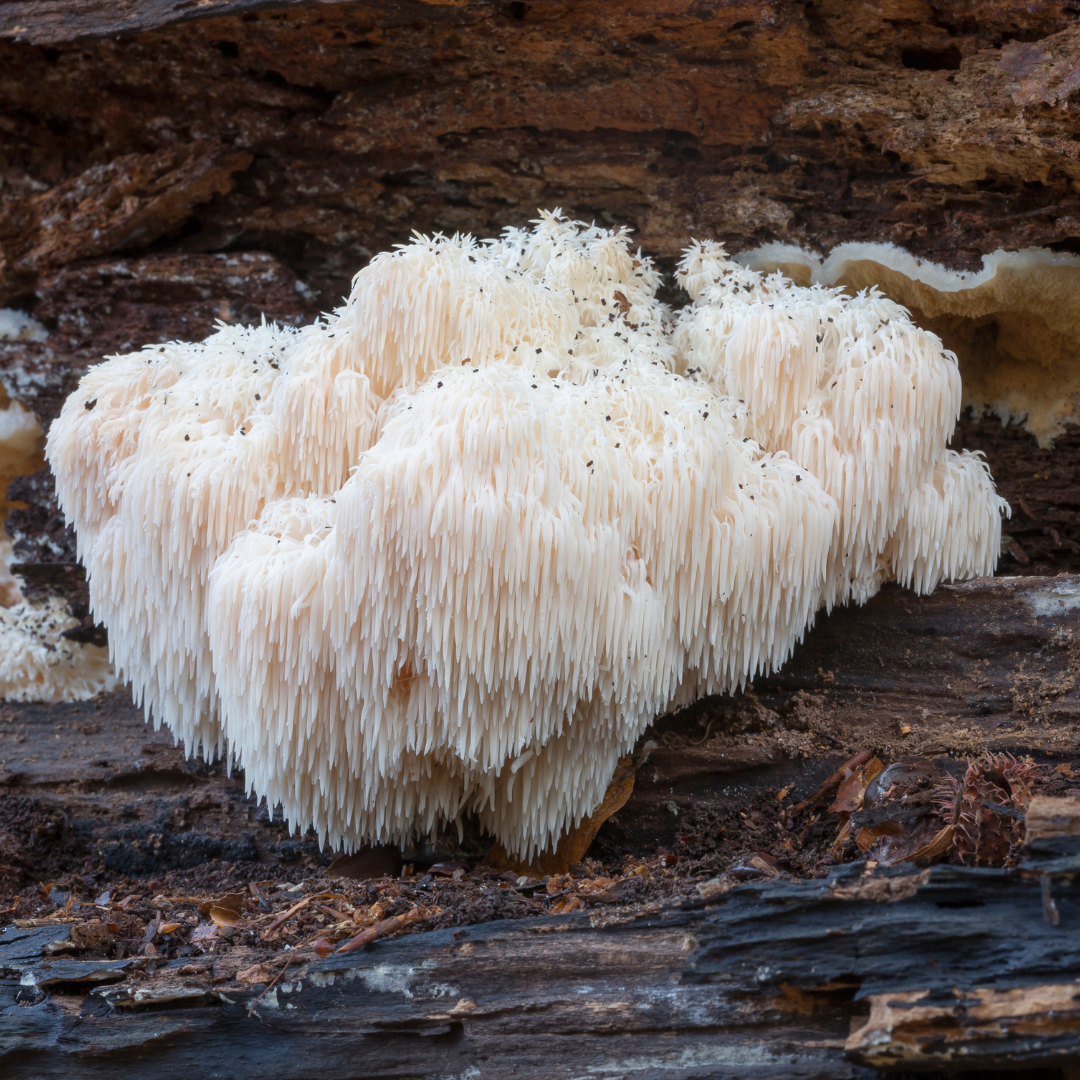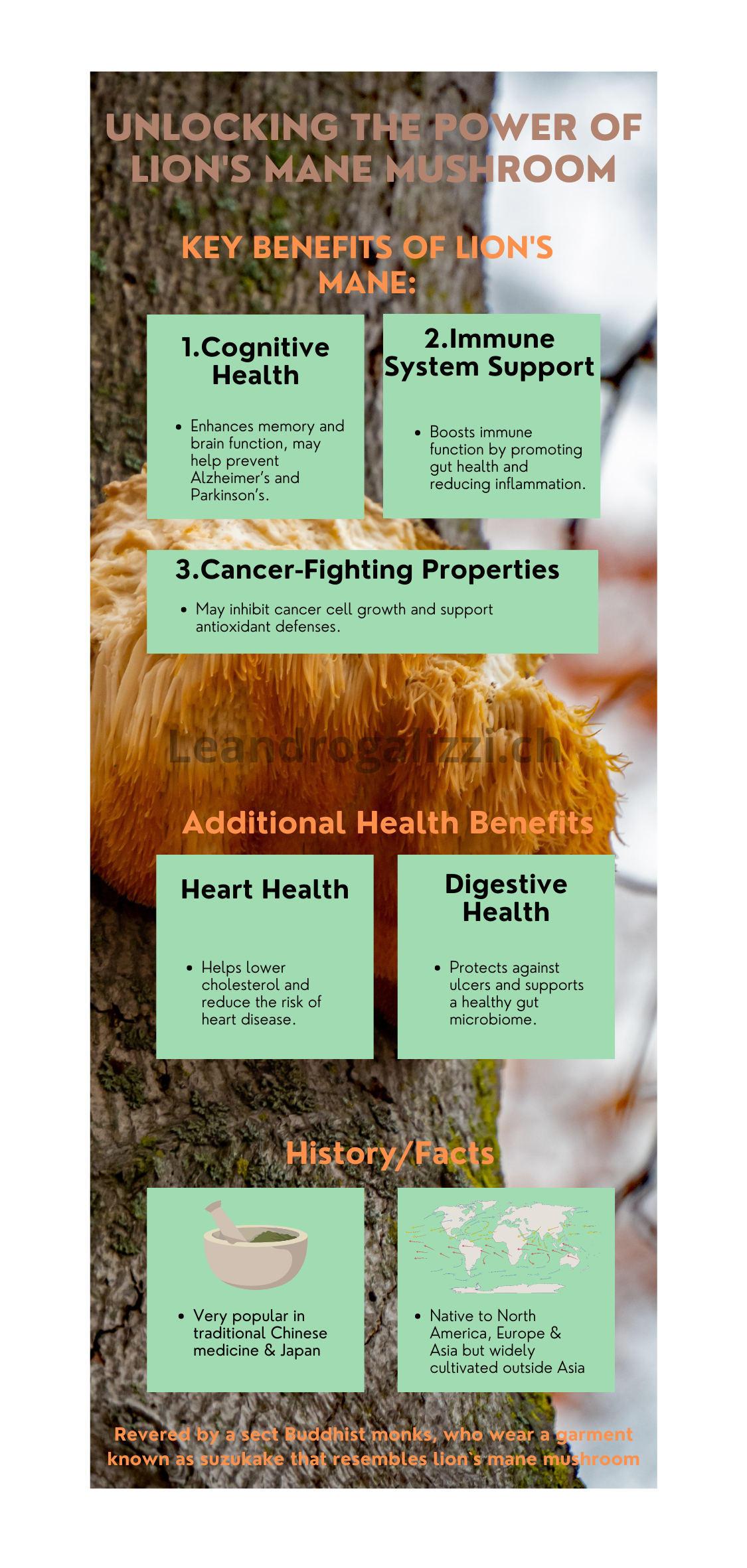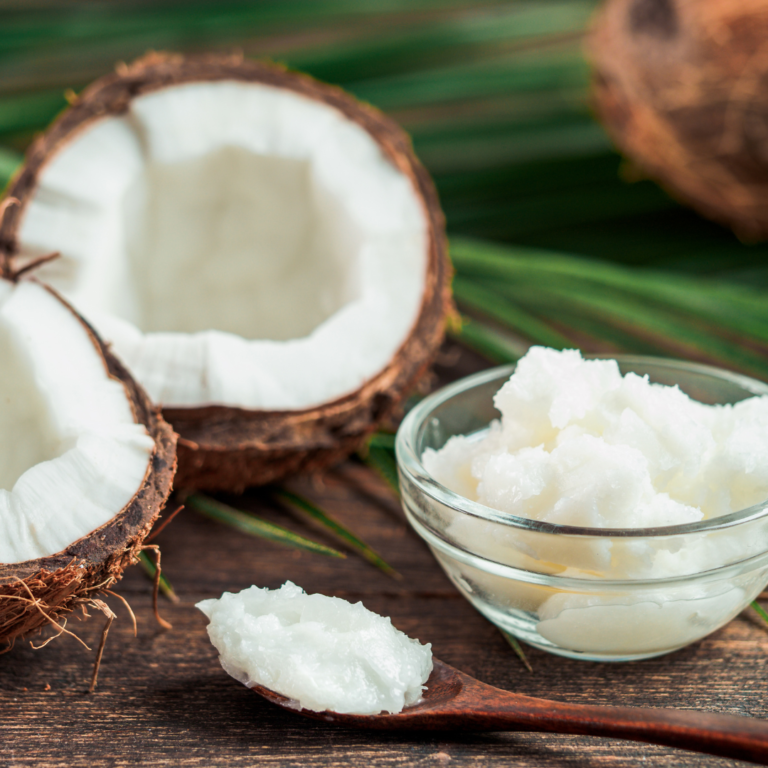Unlocking the Potential of Lion’s Mane: A Comprehensive Guide to Its Cognitive, Immunity, and Cancer-Fighting Benefits

Lion’s Mane mushroom (Hericium erinaceus) is gaining popularity both as a culinary delight and a powerful medicinal supplement. Known for its unique appearance and wide range of health benefits, this mushroom has been used for centuries in traditional medicine. In this blog post, we will delve into the cognitive, immunity, and cancer-fighting benefits of Lion’s Mane mushroom, exploring how it can be a valuable addition to your health regimen.
Table of Contents
- Introduction
- What is Lion’s Mane Mushroom?
- Cognitive Benefits
- Immune System Support
- Cancer-Fighting Properties
- Other Health Benefits
- How to Use Lion’s Mane Mushroom
- Potential Risks and Side Effects
- Conclusion
Introduction
Lion’s Mane mushroom is not only known for its distinctive, shaggy appearance but also for its impressive health benefits. Traditionally used in Asian cultures for both culinary and medicinal purposes, this mushroom is now recognized for its potential to enhance cognitive function, support the immune system, and even fight cancer. In this article, we’ll explore these benefits in detail, providing a comprehensive guide to understanding and using Lion’s Mane mushroom.
What is Lion’s Mane Mushroom?
Lion’s Mane mushroom, scientifically known as Hericium erinaceus, is a white, globe-shaped fungus with long, shaggy spines that resemble the mane of a lion—hence its name. It is native to North America, Europe, and Asia, where it grows on both living and dead broadleaf trees, typically in late summer and fall.
This mushroom has been revered in Traditional Chinese Medicine for centuries, where it was often used to nourish the gut, strengthen the spleen, and boost overall vitality. Today, it is commonly consumed in supplement form or incorporated into various dishes, celebrated for its unique flavor and powerful health benefits.
Cognitive Benefits
Enhancing Brain Function and Memory
Lion’s Mane mushroom is widely recognized for its potential to boost cognitive function. Research suggests that it stimulates the production of nerve growth factor (NGF), a protein that plays a crucial role in the growth, maintenance, and survival of nerve cells, including brain cells.
Several studies have demonstrated that Lion’s Mane can promote neurite outgrowth, which is essential for brain function and memory. For instance, a study published in the International Journal of Medicinal Mushrooms found that Lion’s Mane could enhance the development of new neurons, potentially offering protection against neurodegenerative diseases like Alzheimer’s and Parkinson’s.
Managing Anxiety and Depression
Beyond its cognitive benefits, Lion’s Mane may also help alleviate symptoms of anxiety and depression. Its anti-inflammatory properties appear to play a key role in reducing these symptoms. In a small Japanese study, women who consumed Lion’s Mane mushroom extract reported lower levels of anxiety and irritation compared to those who took a placebo.
This suggests that Lion’s Mane could be a natural alternative for managing mild mental health conditions, although more research is needed to fully understand its effects.
Immune System Support
Boosting Immune Function
Lion’s Mane mushroom is known to have powerful immune-boosting properties, largely due to its ability to stimulate the gut’s immune system. The gut is a critical part of the immune system, acting as a first line of defense against pathogens. Research on mice has shown that Lion’s Mane can enhance the activity of intestinal immune cells, which play a crucial role in protecting the body from infections.
By promoting the growth of beneficial gut bacteria, Lion’s Mane helps to maintain a healthy balance in the digestive system, which in turn supports overall immune function. This makes it a valuable supplement for those looking to strengthen their immune defenses, particularly during cold and flu season.
Anti-Inflammatory Properties
Inflammation is a natural response to injury or infection, but chronic inflammation can lead to various health problems, including autoimmune diseases and cardiovascular conditions. Lion’s Mane mushroom is rich in antioxidants, which help to combat inflammation by neutralizing free radicals—unstable molecules that can cause cellular damage.
Studies have indicated that the anti-inflammatory compounds in Lion’s Mane may reduce the risk of chronic inflammatory conditions, making it a beneficial addition to a diet aimed at promoting long-term health. By lowering inflammation levels, Lion’s Mane supports not only the immune system but also overall well-being.
Cancer-Fighting Properties
Anti-Cancer Effects
One of the most promising areas of research on Lion’s Mane mushroom is its potential role in cancer prevention and treatment. Laboratory studies have shown that Lion’s Mane extract can inhibit the growth of cancer cells and even trigger cancer cell death in certain types of cancers, including leukemia, gastric, and breast cancers.
For example, a study published in the Journal of Agricultural and Food Chemistry highlighted the mushroom’s anticarcinogenic properties, suggesting that it may help slow the progression of tumors. While most of these studies have been conducted on animals or in vitro, the results are encouraging and warrant further investigation in human trials.
Antioxidant and Anti-Aging Benefits
Lion’s Mane is also known for its high antioxidant content, which helps to protect the body from oxidative stress—a key factor in aging and the development of chronic diseases. Antioxidants neutralize free radicals, reducing their harmful effects and potentially lowering the risk of conditions like cancer and heart disease.
By incorporating Lion’s Mane into your diet, you may not only benefit from its potential cancer-fighting properties but also enjoy its anti-aging effects, helping to maintain healthy cells and tissues as you age.

Other Health Benefits
Heart Health
Lion’s Mane mushroom has been shown to support heart health in several ways. It can help lower LDL cholesterol (often referred to as “bad” cholesterol) while increasing HDL cholesterol (“good” cholesterol), thereby improving overall cholesterol levels. Additionally, its ability to reduce triglycerides in the bloodstream further contributes to a healthier cardiovascular system.
Research also suggests that Lion’s Mane may help prevent blood clots, which are a major risk factor for stroke and heart attacks. By supporting healthy blood flow and reducing cholesterol levels, Lion’s Mane contributes to a robust heart health regimen.
Digestive Health
For those suffering from gastrointestinal issues, Lion’s Mane mushroom may offer some relief. It has been shown to protect against stomach ulcers by inhibiting the growth of H. pylori, a bacteria often responsible for causing ulcers. Additionally, its anti-inflammatory properties can help reduce symptoms of inflammatory bowel disease (IBD), such as Crohn’s disease and ulcerative colitis.
Lion’s Mane may also support a healthy gut microbiome by promoting the growth of beneficial bacteria, further enhancing digestive health. This makes it an excellent choice for those looking to improve their gut health naturally.
How to Use Lion’s Mane Mushroom
Forms and Dosages
Lion’s Mane mushroom is available in several forms, including fresh mushrooms, powders, capsules, and liquid extracts. The form you choose depends largely on your personal preference and how you plan to incorporate it into your routine. Fresh Lion’s Mane mushrooms can be cooked and added to meals, while powders and capsules are more convenient for those looking for a quick and easy supplement.
The recommended dosage of Lion’s Mane varies depending on the form and the desired effect. For general health maintenance, a typical dose is around 500 to 3,000 milligrams per day. However, it’s essential to follow the dosage instructions provided on the product label or consult with a healthcare provider to determine the appropriate amount for your needs.
Culinary Uses
If you prefer to consume Lion’s Mane in its natural form, it makes a delicious addition to various dishes. Its texture is often compared to seafood, particularly crab or lobster, making it a popular ingredient in vegetarian and vegan cooking. You can sauté Lion’s Mane with garlic and butter for a simple yet flavorful side dish, or add it to stir-fries, soups, and stews.
For those interested in exploring more creative uses, Lion’s Mane can also be incorporated into mushroom coffee, smoothies, or even as a meat substitute in recipes like mushroom burgers or tacos. The possibilities are endless, and experimenting with this versatile mushroom can be both fun and rewarding.
Potential Risks and Side Effects
Lion’s Mane mushroom is generally considered safe for most people, especially when consumed in moderate amounts as part of a balanced diet. However, like any supplement or new food, it’s important to be aware of potential risks and side effects. Some individuals may experience allergic reactions, such as skin rashes or difficulty breathing, particularly if they have a sensitivity to mushrooms.
In rare cases, gastrointestinal discomfort may occur, especially when taking high doses of Lion’s Mane supplements. If you experience any adverse reactions, it’s advisable to discontinue use and consult with a healthcare professional.
Additionally, because Lion’s Mane can interact with certain medications, particularly those that affect blood clotting, it’s crucial to speak with your doctor before starting any new supplement, especially if you are taking other medications or have underlying health conditions.
Conclusion
Lion’s Mane mushroom is a remarkable fungus with a wide range of potential health benefits, from enhancing cognitive function and supporting the immune system to fighting cancer and improving heart and digestive health. Whether you choose to enjoy it as a flavorful addition to your meals or as a convenient supplement, incorporating Lion’s Mane into your daily routine could be a valuable step towards better health.
As with any supplement, it’s important to use Lion’s Mane responsibly and in consultation with a healthcare provider, particularly if you have existing health concerns. With its impressive array of benefits and relatively low risk of side effects, Lion’s Mane mushroom is a natural option worth considering for anyone looking to enhance their overall well-being.
Ready to give Lion’s Mane a try? Explore high-quality supplements or seek out fresh mushrooms at your local health food store, and experience the potential benefits for yourself!
References
- Mori, K., et al. (2011). “Effects of Hericium erinaceus on Amyloid β(25-35) Peptide-induced Learning and Memory Deficits in Mice.” Phytotherapy Research. 25(4): 611-618.
- Wong, K.H., et al. (2012). “Neuroregenerative Potential of Lion’s Mane Mushroom, Hericium erinaceus (Bull.: Fr.) Pers. (Aphyllophoromycetideae) Mycelia Extracts in a Rat Model.” Evidence-Based Complementary and Alternative Medicine. Volume 2012, Article ID 369308.
- Li, I.C., et al. (2015). “Neurohealth Properties of Hericium erinaceus Mycelia Enriched with Erinacines.” Behavioural Neurology. Volume 2015, Article ID 568295.
- Nagano, M., et al. (2010). “Reduction of Depression and Anxiety by 4 Weeks Hericium erinaceus Intake.” Biomedical Research. 31(4): 231-237.
- Kim, S.P., et al. (2011). “Anti-cancer Effects of Hericium erinaceus in Colon Cancer Cells and a Mouse Xenograft Model.” International Journal of Biological Macromolecules. 48(3): 490-494.
- Zhao, J., et al. (2016). “Antioxidant and Immunomodulatory Activities of Polysaccharides from Lion’s Mane Mushroom.” International Journal of Biological Macromolecules. 93(Pt A): 212-217.






